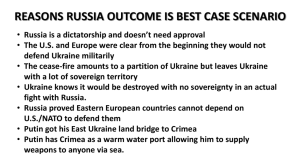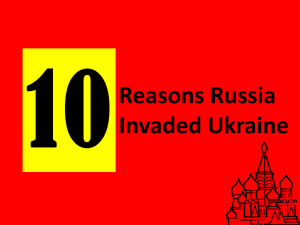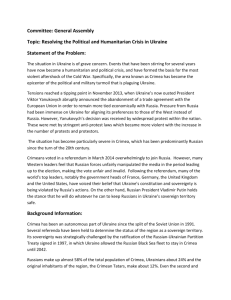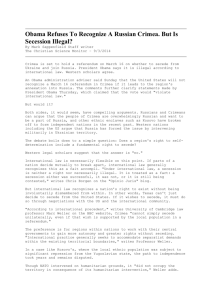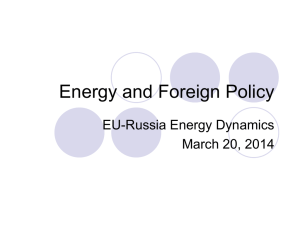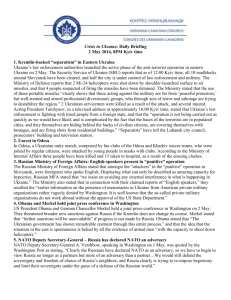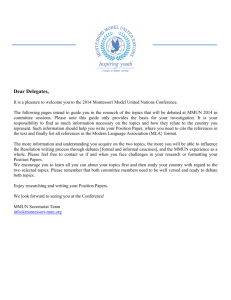Activity: History in the news: Russia and Ukraine
advertisement
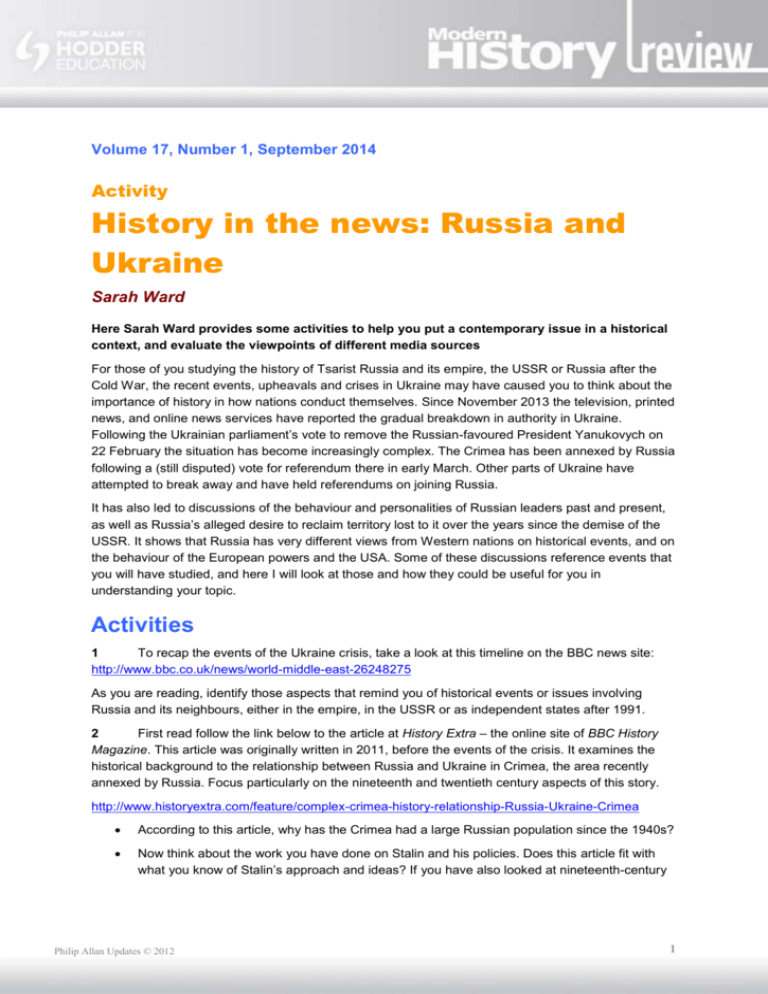
Volume 17, Number 1, September 2014 Activity History in the news: Russia and Ukraine Sarah Ward Here Sarah Ward provides some activities to help you put a contemporary issue in a historical context, and evaluate the viewpoints of different media sources For those of you studying the history of Tsarist Russia and its empire, the USSR or Russia after the Cold War, the recent events, upheavals and crises in Ukraine may have caused you to think about the importance of history in how nations conduct themselves. Since November 2013 the television, printed news, and online news services have reported the gradual breakdown in authority in Ukraine. Following the Ukrainian parliament’s vote to remove the Russian-favoured President Yanukovych on 22 February the situation has become increasingly complex. The Crimea has been annexed by Russia following a (still disputed) vote for referendum there in early March. Other parts of Ukraine have attempted to break away and have held referendums on joining Russia. It has also led to discussions of the behaviour and personalities of Russian leaders past and present, as well as Russia’s alleged desire to reclaim territory lost to it over the years since the demise of the USSR. It shows that Russia has very different views from Western nations on historical events, and on the behaviour of the European powers and the USA. Some of these discussions reference events that you will have studied, and here I will look at those and how they could be useful for you in understanding your topic. Activities 1 To recap the events of the Ukraine crisis, take a look at this timeline on the BBC news site: http://www.bbc.co.uk/news/world-middle-east-26248275 As you are reading, identify those aspects that remind you of historical events or issues involving Russia and its neighbours, either in the empire, in the USSR or as independent states after 1991. 2 First read follow the link below to the article at History Extra – the online site of BBC History Magazine. This article was originally written in 2011, before the events of the crisis. It examines the historical background to the relationship between Russia and Ukraine in Crimea, the area recently annexed by Russia. Focus particularly on the nineteenth and twentieth century aspects of this story. http://www.historyextra.com/feature/complex-crimea-history-relationship-Russia-Ukraine-Crimea According to this article, why has the Crimea had a large Russian population since the 1940s? Now think about the work you have done on Stalin and his policies. Does this article fit with what you know of Stalin’s approach and ideas? If you have also looked at nineteenth-century Philip Allan Updates © 2012 1 Russia, are there any tsars who followed similar policies of Russification? Note which tsars did this, when, and to whom. After Stalin’s death in 1954 the situation changed. Summarise the article’s explanation for why the Crimea was given to Ukraine by Khrushchev and Malenkov. Note how the structures of the government of the USSR played their part in this. Identify at least three reasons why this crisis has its roots in the history of the region. 3 Next look at this article in the British newspaper the Guardian. It was written in March 2014 and aims to provide a mixture of modern explanations and historical context in relation to Russia, Ukraine and the Crimea. http://www.theguardian.com/world/2014/mar/07/ukraine-russia-crimea-naval-base-tatars-explainer What are the modern explanations it provides for the crisis? What do they have in common with the historical explanations in the History Extra article? Which historical events from the nineteenth and twentieth centuries does the Guardian mention? Note any events that were not discussed in the History Extra article. Now consider the nature, origin and purpose of this article. What is it intended to do? Is the authorship relevant to its message and if so, why? Can this article be described as ‘objective’? Objectivity is notoriously difficult to achieve. If you think the article is not objective then identify those aspects that you think reveal this. (Clue: imagine whether Russians would agree with some of the points raised here.) 4 Throughout the crisis, European powers and the USA have looked anxiously on. They are worried that Russia is aiming to expand its borders again and that there is potential for a European war. This next article from the New York Times in early May 2014 is entitled ‘From Crimea, Putin Trumpets Mother Russia’. http://www.nytimes.com/2014/05/10/world/europe/russia-celebrates-victory-day.html?_r=0 How does this article explain the crisis and Putin’s visit to Sevastopol? Which historical events from the twentieth century does the New York Times mention? Does the use of any of these events, mentioned in the other two articles, surprise you? Why? Consider the nature, origin and purpose of this article. How does the authorship and country of origin influence the content and viewpoint of this article? What differences are there between the two articles (in the Guardian and the New York Times) in terms of their approach to and explanation of these events? How might you explain any differences? 5 Finally, look at this article in the English-language version of the Russian paper Pravda. It is an opinion column that looks at the involvement of the USA and Europe in the Ukraine crisis. It speaks particularly to Germany as an economic and political leader in the European Union. It makes references to twentieth-century history and strongly reflects long-held rivalries between Russia and the USA, similar to those you have studied. It was published in May 2014 and is entitled ‘Can Germans afford it third time?’ [sic] http://english.pravda.ru/opinion/columnists/12-05-2014/127547-germans_third_time-0/ Philip Allan Updates © 2012 2 How does this article explain the crisis in Ukraine? Does it mention the same events as the New York Times or the Guardian? Identify those events that are the same and, separately, those that are different. Consider the nature, origin and purpose of this article. How does the authorship and country of origin influence its content and viewpoint? Contrast this article with the other two newspaper articles. How does the Russian columnist’s use of historical events differ from that of the American newspaper? Which events are viewed in different ways, and how might you use historical context to explain this? This debate has been revealing in showing how prevalent ‘Cold War’ references and attitudes still are in the world today. It also demonstrates how history is often pressed into service for the use of the present. Think about this as you study your Russian modules, and also when people ask you what the point is of studying history. This resource is part of MODERN HISTORY REVIEW , a magazine written for A-level students by subject experts. To subscribe to the full magazine go to: http://www.hoddereducation.co.uk/historyreview Philip Allan Updates © 2012 3


